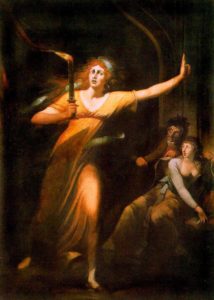Once again, Bardfilm offers a guest post for our edification—or, at least, for our amusement.

The English language offers a host of interesting collective nouns. You can describe a lot of geese as a gaggle of geese. More than a few whales make up a pod of whales. When you see tons of crows around, it’s natural (and fun) to say, “A murder of crows was on the neighbor’s back tree this morning.”
But what if you have a lot of Hamlets running around? How do you refer to the twenty-three Lady Macbeths you saw auditioning last night?
Here’s a list for exactly those instances. Think how useful (and fun) it will be to say, “I’m not looking forward to auditions. There’s a whole scrub of Lady Macbeths out there!” Without much more ado, here they are:
Shakespearean Collective Nouns
- An innocence of Desdemonas.
- A sack of Falstaffs.
- An assignation of Bottoms.
- An ide of Caesars.
- A jealousy of Iagos.
- A wherefore of Romeos.
- A vengeance of Hamlets.
- A fahrenfoul of witches.
- An obscurity of Pericleses.
- A gurgle of Ophelias.
- A torrent of Lears.
- An equivocation of Porters.
- An infinite variety of Cleopatras.
- A platitude of Poloniuses.
- A poke of Gloucesters.
- A scrub of Lady Macbeths.
- A discontent of Richard IIIs.
Feel free to add your own options in the comments below. I know you’ve seen one too many Juliets—how would you describe them as a group?
Our thanks to kj, the author of Bardfilm. Bardfilm is a blog that comments on films, plays, and other matters related to Shakespeare in a relatively-informal manner.
This “Best Of” article originally appeared December 2010.
